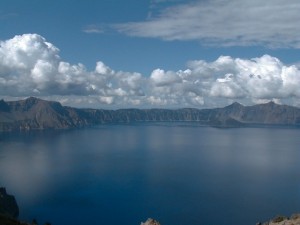January 2, 2013Contact:
Steve Pedery, Conservation Director, Oregon Wild, sp@oregonwild.org, (503) 283-6343 ext. 212
Francis Eatherington, Conservation Director, Cascadia Wildlands, francis@cascwild.org, (541) 643-1309
Nick Cady, Legal Director, Cascadia Wildlands, nick@cascwild.org, (541) 434-1463
Portland, OR — Conservationists today filed a Notice of Intent to challenge an old-growth logging sale on the doorstep of iconic Crater Lake National Park. The Umpqua National Forest is offering the sale as part of a massive proposal to log forests bordering the park, including some of the state’s most popular recreation areas around Lemolo and Diamond Lakes. Conservationists are expressing concern the Forest Service is violating laws designed to protect rare and vulnerable wildlife which also call the area home.

The Dbug timber sale is on the flanks of Crater Lake (F Eatherington).
The DBug timber sale, one of several proposed logging projects located near the Crater Lake National Park boundary, generated immediate, national controversy when it was announced in 2009. As originally proposed, the project included more commercial logging and road building in pristine roadless areas than had occurred across the entire country during the Bush administration. It was widely seen as a test of the Obama administration’s commitment to conservation of the nation’s remaining pristine backcountry.
Conservationists, recreation groups, local businesses and homeowners created citizen’s alternatives which addressed legitimate needs for public safety near homes and in popular recreation areas while avoiding unnecessary logging and development in pristine backcountry. After receiving thousands of public comments, the Forest Service dropped some of the most egregious portions of the sale. However, the Forest Service is once again pushing forward by auctioning old-growth forests which provide critical habitat for federally protected species.
The wildlands surrounding Crater Lake National Park are some of the most visited in the state. Visitors flock to the area to camp, fish, hike, and ski the area’s pristine backcountry, providing a boost to local economies. Unfortunately, these areas have also been some of the most heavily logged of the Umpqua National Forest, and the area’s remaining wildlands are home to several species of rare fish, wildlife, and plants. Much of the project area has been proposed for protection as Wilderness to maintain critical corridors for wildlife and allow the continuation of traditional quiet recreation.
Conservation groups are asking the Forest Service to reassess the proposed project and avoid causing serious harm to critical wildlife habitat and old-growth forests in the area. Doing so will avoid further unnecessary conflict and controversy.
More information on the Citizen’s Alternative Proposals, video of the project area, and other information on the DBug timber sale can be found here.
# # #
